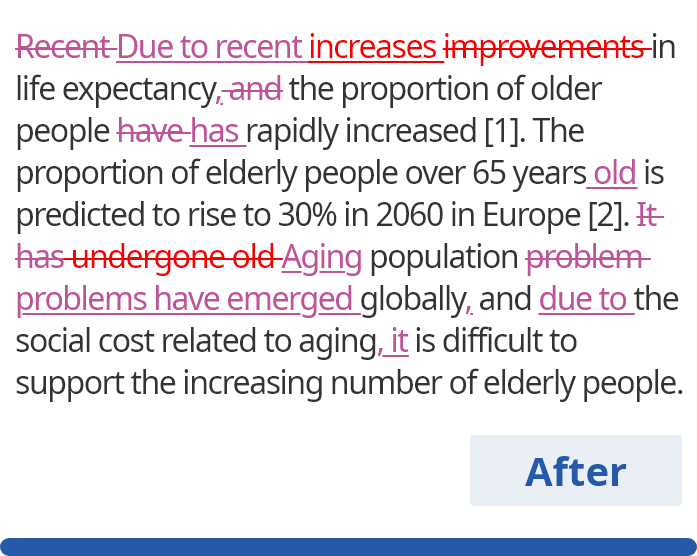How to Use Modifiers
The root word “modify” in “modifiers” means to change or alter something. As such, the purpose of a modifier is to change, clarify, emphasize, or limit other words and phrases in a sentence. A modifier can be a word, phrase, or clause and functions as an adjective or adverb.
- Adjective
- I want a delicious sandwich for lunch.
- Adverb
- You have to run fast to get there in time.
- Adjective Clause
- She is the one who knows the recipe.
Table of Contents
What Are Misplaced Modifiers?
A misplaced modifier is a modifier that is not positioned appropriately to modify the word, phrase, or clause it is supposed to modify.
It usually makes sense for a modifier to be placed right next to the word the modifier is supposed to describe. However, when the modifier is placed somewhere else in the sentence, it might end up modifying the wrong part of the sentence.
- Incorrect
- She met a new friend working at the school.
- Correct
- She met a new friend while working at the school.
- Correct
- She met a new friend who works at the school.
This sentence is ambiguous in meaning because it is unclear whether the modifier “working at the school”' is modifying “a new friend,” or “She.”
The first sentence can have two meanings.
1. She met a new friend while she was working at the school.
2. She met a new friend who works at the school.
- Incorrect
- He said after New Year’s day he will stop smoking.
- Correct
- He said that, after New Year’s day, he will stop smoking.
- Correct
- He said after New Year’s day that he will stop smoking.
Limiting modifiers
A limiting modifier is a modifier that limits the meaning of the word it modifies.
almost, hardly, nearly, just, only, merely are some common limiting modifiers. Limiting modifiers should be placed immediately before the word they modify. Separating the limiting modifier and the word it modifies is likely to confuse the readers because the relationship between the modifier and the word it is supposed to modify becomes unclear.
- Example
- Only she wants to go out.
She only wants to go out.
Depending on where the limiting modifier(only) is placed in the sentence, the meaning of the sentence can change entirely.
The first sentence implies that among all other people, she is the only one who wants to go out. The second sentence implies that the only thing she wants to do is to go out.
Both sentences are grammatically correct, but they can have two different meanings.
- Example
- I almost won $500.
I won almost $500.
The first sentence implies that I came close to winning $500 but didn't. The second sentence implies that the amount of money I won is close to $500.
How to fix misplaced modifiers
Misplaced modifiers can be fixed by simply changing the position of the modifier. Placing the modifier immediately before or after the noun, pronoun, adjective, or verb it is supposed to modify will correct the problem.
- Incorrect
- The politician was interviewed after the crime was committed by the reporters.
- Correct
- The politician was interviewed by the reporters after the crime was committed.
- Incorrect
- The girl walked the dog in the red sweater.
- Correct
- The girl in the red sweater walked the dog.
- Incorrect
- Though hungry and cold, the food was left untouched by the students.
- Correct
- Though hungry and cold, the students did not touch the food.
What Are Dangling Modifiers?
In a sentence with a dangling modifier, the subject that the modifier is supposed to modify is omitted. Instead, another subject appears in its place.
When the modifier is placed at the very beginning of the sentence, the subject that the modifier is modifying should appear immediately after.
- Incorrect
- Walking through the forest, a wolf appeared in front of her.
- Correct
- Walking through the forest, she encountered a wolf.
In this case, it wasn't the wolf that was walking through the forest, it was her. Therefore, the subject of the main clause should be changed.
- Incorrect
- Upon entering the room, the food came into her sight.
- Correct
- Upon entering the room, she saw the food.
In this case, it wasn't the food that entered the room, it was she. Therefore, the subject of the main clause has to be changed.
How to fix dangling modifiers
There are two ways to fix the dangling modifier issue. Typically, the subject of the main clause can be changed so that the subject is placed right after the modifier phrase. Another way to fix the issue is to include the subject the modifier is supposed to modify in the modifier phrase.
Change the subject of the main clause
Change the subject of the main clause to the one that the modifier is supposed to modify.
Revise the modifier phrase
Include the subject in the modifier phrase and leave the main clause as it is.
- Incorrect
- Not having finished the assignment, the game could not begin.
- Correct
-
Not having finished the assignment, I could not begin the game.
Since I did not finish the assignment, the game could not begin.
- Incorrect
- Cold and hungry, the dinner was devoured by the boys.
- Correct
-
Cold and hungry, the boys devoured the dinner.
The boys, who were cold and hungry, devoured the dinner.












